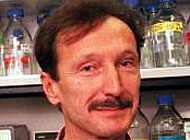
Luck and persistence equals Nobel success

When the Nobel prizes are announced next week in Sweden, the recipients will suddenly enjoy an international reputation far beyond their field. Professor Rolf Zinkernagel of Zurich University knows the feeling well - five years ago, he was the joint winner of the 1996 prize for medicine.
“In the perception of the general public, it makes you a different person,” said Zinkernagel, who has worked at the university’s institute of experimental immunology for the past 22 years.
“It opens up new possibilities to talk about science and to communicate the special qualities of science to a wider audience. You become a public figure and people are more inclined to listen to you. For example, I used the opportunity to write in the tabloid ‘Blick’ newspaper.”
Zinkernagel was awarded the prize for his research in immunology, along with Peter Doherty of Australia between 1973 and 1975. The two men discovered how the body’s immune system recognises virus-infected cells.
Unexpected result
In the last 25 years, scientists building on their research have transformed our understanding of the development and functioning of the immune system.
The groundbreaking discovery came about almost by accident, Zinkernagel told swissinfo. “Doherty and myself planned this experiment for completely different reasons. We had a particular idea, which we wanted to test.
“During testing, we were confronted with two sets of data, which really didn’t fit at all and ran counter to established ideas about the interaction of immune t-cells with virus infected cells of the body. Because it was so unexpected, it was clear that something very fundamental had just fallen into our lap by chance.”
Luck and perseverance are part of the equation which makes a Nobel prize winning scientist, said Zinkernagel.
More effective vaccines
“I think it’s also knowing a situation so well that if something unexpected comes out, it isn’t just swept under the carpet because you think it’s a mistake or a bad experiment.
“In general, I think we are not clever enough to ask the really important questions and very often it’s a chance observation which kicks the ball a few yards further.”
A quarter of a century after Zinkernagel and Doherty’s research, scientists around the world are still trying to exploit the discovery in their search for more effective vaccines.
“We are trying to find out how exactly t-cells get going and how they start an immune response,” said Zinkernagel.
“If we understood that, it would then perhaps be possible to use that knowledge to make good immune responses against tumours such as carcinomas or sarcomas or to improve on vaccines. These very simple rules are still relatively little understood.”
by Vincent Landon

In compliance with the JTI standards
More: SWI swissinfo.ch certified by the Journalism Trust Initiative


























You can find an overview of ongoing debates with our journalists here . Please join us!
If you want to start a conversation about a topic raised in this article or want to report factual errors, email us at english@swissinfo.ch.